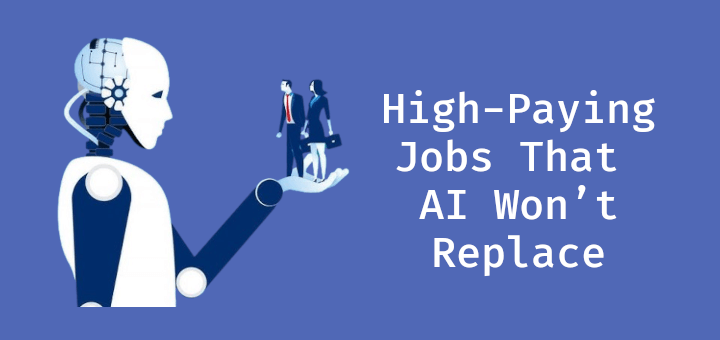Artificial Intelligence (AI) is revolutionizing industries, automating repetitive tasks, and reshaping the global workforce. Despite its remarkable advancements, certain professions remain beyond AI’s capabilities due to their reliance on uniquely human traits like creativity, empathy, and critical thinking.
This case study explores the 10 highest-paying, fastest-growing jobs in 2025 that AI won’t replace, delving into why these roles are indispensable and how they are evolving in an AI-driven world.
1. Healthcare Professionals (Doctors, Surgeons, and Nurses)
Healthcare is fundamentally a human-centered field. While AI enhances diagnostics and assists in surgeries with precision tools, it cannot replace the empathy and decision-making required in patient care.
A doctor’s ability to connect emotionally with patients, assess subtle symptoms, and make ethical decisions in critical moments is irreplaceable. Nurses, similarly, provide compassionate support and adapt to unforeseen challenges in ways that no machine can replicate.
Real-World Impact:
AI-powered diagnostic tools like IBM Watson are helping doctors detect diseases early, but they function as assistants, not replacements. A surgeon using a robotic arm for precision still relies on their expertise to guide the procedure.
Growth Factors:
- An aging global population requires more medical professionals.
- Advancements in medical technology are creating specialized roles.
- Increased awareness of mental and physical health is driving demand.
Average Salary (2025):
- Doctors/Surgeons: $200,000+
- Nurses: $80,000+
2. Teachers and Educators
Education extends beyond delivering knowledge; it involves inspiring, mentoring, and understanding the unique needs of each student. Teachers shape minds, foster creativity, and encourage critical thinking.
AI tools can provide supplementary learning, but they cannot replace the emotional connection and tailored guidance educators offer.

Real-World Impact:
In classrooms worldwide, AI platforms like Duolingo and Khan Academy assist with personalized learning. However, the role of a teacher in managing classroom dynamics, motivating students, and addressing individual struggles remains crucial.
Growth Factors:
- The rise of specialized education, including STEM and arts.
- Increased adoption of hybrid learning models combining online and in-person teaching.
- Growing emphasis on lifelong learning and skill development.
Average Salary (2025): $50,000 – $120,000
3. Creative Professionals (Writers, Artists, and Designers)
Creativity is one of the most distinctly human traits. While AI can generate text, images, or designs, it lacks originality, emotional depth, and cultural relevance.
Writers craft compelling stories, artists evoke emotions through their work, and designers create innovative solutions tailored to human needs.

Real-World Impact:
AI-generated content tools like ChatGPT or DALL·E are transforming industries, but they serve as tools rather than creators. A human writer or designer ensures that the final product resonates with the target audience, aligns with cultural nuances, and achieves strategic goals.
Growth Factors:
- Expansion of digital media and streaming platforms.
- Growing demand for unique branding and storytelling in businesses.
- Increased investment in gaming, virtual reality, and the metaverse.
Average Salary (2025): $60,000 – $150,000
4. Cybersecurity Specialists
Cybersecurity involves protecting systems, networks, and data from ever-evolving threats. While AI tools detect anomalies and automate responses, they rely on human experts to interpret complex scenarios, devise strategies, and adapt to emerging risks.
Cybersecurity specialists combine technical skills with critical thinking to outsmart attackers.

Real-World Impact:
Tools like FireEye and Darktrace use AI to monitor and mitigate cyber threats, but human analysts are essential for responding to sophisticated attacks and securing critical infrastructure.
Growth Factors:
- Increasing frequency and sophistication of cyberattacks.
- Growing reliance on digital infrastructure across industries.
- Expansion of remote work and cloud computing.
Average Salary (2025): $100,000 – $180,000
5. Legal Professionals (Lawyers and Judges)
Legal work requires interpreting laws, crafting persuasive arguments, and navigating ethical dilemmas – tasks that demand human judgment, intuition, and creativity.
While AI tools assist in legal research and document analysis, they cannot replace the nuanced understanding of human behavior and societal norms that lawyers and judges bring.

Real-World Impact:
AI platforms like ROSS Intelligence streamline research, but lawyers remain indispensable for negotiating contracts, representing clients in court, and providing strategic counsel.
Growth Factors:
- Rising demand for legal expertise in technology and privacy laws.
- Increased focus on intellectual property and AI ethics.
- Growth in global trade and regulatory compliance.
Average Salary (2025): $120,000 – $250,000
6. Mental Health Professionals (Therapists and Psychologists)
Addressing mental health challenges requires deep empathy, active listening, and the ability to build trust – all qualities that AI lacks. Therapists and psychologists create safe spaces for clients to share their feelings and guide them through complex emotional journeys.

Real-World Impact:
AI-powered mental health apps like Woebot offer support, but they cannot replace the nuanced understanding and tailored interventions provided by human professionals.
Growth Factors:
- Increased awareness and destigmatization of mental health issues.
- Rising demand for therapy due to modern stressors.
- Growth in workplace mental health initiatives.
Average Salary (2025): $70,000 – $150,000
7. Skilled Trades (Electricians, Plumbers, and Carpenters)
Skilled trades involve hands-on expertise, adaptability, and problem-solving in unpredictable environments. AI-powered robots can assist with specific tasks but lack the dexterity and situational awareness required for complex repairs or installations.

Real-World Impact:
Electricians and plumbers are vital for maintaining and upgrading infrastructure, particularly in renewable energy and smart home systems. Their expertise ensures safety and efficiency in ways machines cannot.
Growth Factors:
- Increased investment in construction and infrastructure projects.
- Demand for sustainable energy solutions and smart technologies.
- Shortage of skilled workers due to aging tradespeople.
Average Salary (2025): $50,000 – $100,000
8. Marketing and Sales Professionals
Marketing and sales rely on understanding customer needs, building relationships, and crafting compelling campaigns. AI tools analyze data and optimize strategies, but human professionals bring creativity, intuition, and the ability to connect emotionally with clients.

Real-World Impact:
AI-driven tools like HubSpot and Salesforce enhance efficiency, but marketers and salespeople remain essential for creating brand narratives, closing deals, and fostering long-term partnerships.
Growth Factors:
- Growth in e-commerce and digital marketing.
- Expansion into global markets with diverse audiences.
- Increased competition among brands for consumer attention.
Average Salary (2025): $70,000 – $200,000
9. Data Scientists and Analysts
Data scientists and analysts turn raw data into actionable insights, asking the right questions and interpreting results in a business context. While AI processes data at scale, it requires human expertise to understand nuances, identify patterns, and make strategic decisions.

Real-World Impact:
AI tools like Tableau and Power BI visualize data, but human analysts ensure that insights align with organizational goals and drive meaningful outcomes.
Growth Factors:
- Proliferation of big data across industries.
- Growing demand for data-driven decision-making.
- Integration of AI and machine learning into business processes.
Average Salary (2025): $120,000 – $200,000
10. Entrepreneurs and Business Leaders
Entrepreneurship and leadership require vision, strategic thinking, and the ability to inspire and motivate teams. AI can optimize operations but cannot replicate the innovation and risk-taking that drive business success.

Real-World Impact:
From startups to multinational corporations, human leaders guide organizations through uncertainty, seize opportunities, and build cultures that foster creativity and collaboration.
Growth Factors:
- Rise of startups in emerging industries like clean energy and AI.
- Increased focus on sustainability and social impact.
- Globalization of markets and supply chains.
Average Salary (2025): Varies widely; potential for millions
Conclusion
AI is a powerful tool, but it is not a replacement for human expertise in fields requiring creativity, empathy, and critical thinking. As technology evolves, these roles will continue to grow, offering lucrative opportunities for those who embrace lifelong learning and adapt to changing demands.
By focusing on careers that leverage uniquely human traits, individuals can future-proof their professions and thrive in an AI-driven world.

